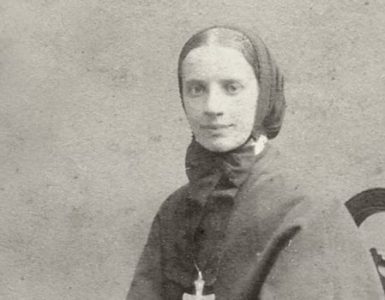The desert sun burned her face, the hot sand tore at her tired feet. She staggered toward Egypt, hurt and angry, and, let’s face it, not altogether innocent. And she had probably never felt more alone.
In that moment of quiet desperation, God found her.
Her name was Hagar. Her story isn’t one we usually pull out for inspiration—but within Genesis, there she is, her life full of meaning for anyone who’s ever turned to something other than God to escape the pain of use, rejection, neglect, indifference, homesickness. Who runs away from what seems too hard to bear, and feels the weight, sometimes, of their own guilt slung across their back like an unwelcome burden. Whose eyes sting with tears from being unseen, unheard, and unloved despite desperate attempts to be noticed.
But for Hagar, that was all about to change.
Her story begins in Egypt, where the Patriarch Abram and his wife Sarai had traveled to seek respite from the famine of Canaan—the land promised them by God. We don’t hear in Scripture that God had told them to go to Egypt, and that could point to a wavering in the faith that had carried them far from home already. But it wasn’t their only problem.
Once in Egypt, Pharaoh took a liking to the lovely Sarai, and she was brought into his harem under the falsehood—spun from Abram’s fear for his life—that she was his sister. Pharaoh treated Abram well for her sake and lavished him with gifts, but the Lord wasn’t going to stand by and watch while the very couple the entire promise rested on lingered in Egypt.
So God sent disease to ravage Pharaoh’s household, and a suspicious Pharaoh quickly uncovered the truth. Disgusted with Abram’s lie, he sent Abram and his household away, complete with their servants and animals. And with them went an Egyptian woman, who tradition suggests was actually one of Pharaoh’s daughters given to Sarai to be a handmaiden: Hagar.
Whether she was Pharaoh’s daughter or not, she was about to travel far from home, to join a new family, the fledgling family of faith. She was leaving behind all the false gods of Egypt, everything familiar, and everything she possessed. Essentially, she was a slave. Nothing was hers anymore—not even her womb.
The Bible tells us that Sarai, growing older and with no sign of producing the heir that God had promised Abram, began to come up with her own plan to fulfill God’s promises. The absurdity of this isn’t lost on us, although we can probably all admit to the temptation to take matters in our own hands sometimes, when God delays (which in the end, is always for our good). We can almost hear the tempter in Sarai’s ear, unoriginal as always, echoing his words to Eve: “Did God really say…” and as the years pass, Sarai begins to doubt.
So she tells Abram to sleep with Hagar, to take her as a second wife, in the hopes that by her, a son will be born for Sarai to raise. We don’t have any record of Abram protesting or hesitating. Once again, the husband simply takes the fruit.
And fruit there was. Hagar, soon pregnant, began to “look with contempt on her mistress.” (Gen 16:4) Perhaps the resentments and loneliness of this slave girl’s life rose up in all their ugliness, and Sarai quickly realized how deeply her plan was flawed: for while the child was Abram’s, it was definitely not hers, and someone was not going to let her forget it.
Sarai was furious and demanded that Abram do something. So, once again, without protest, he gave in.
“Behold, your maid is in your power, do to her as you please.” With those words of absolute indifference, she lost her position and once again became merely a slave. “Then Sarai dealt harshly with her.” (Gen 16:6)
We are reminded at every turn that the people of the promise are just as broken as anyone, that God has great patience with very imperfect people. That His plan is not dependent on our flawless execution of His will. And that’s a relief, but it doesn’t mean that we won’t make things quite a bit harder for ourselves with every step outside of His story. Yet, even there—especially there—He meets us.
Hagar’s name comes from the Aramaic, Hajara, which means “flight.” And indeed, she flew, running away toward to the only other home she knew. With her swollen belly and her contracted heart, unable to bear the shame and the mistreatment, she headed back to Egypt.
There’s a part of all of us that can identify. Hurt…well, it hurts. Instinctively, we avoid what brings pain—whether it be people, memories, circumstances beyond our control. Or things that were once in our control but have spiraled out of control because of our neglect. We avert our eyes. We close our ears. We avoid. We run. We numb ourselves with food or drink or shopping or entertainment or unhealthy relationships. We turn back to the false gods of Egypt because the even people of the One True God have let us down. And yet we know, deep down, we’ve really let ourselves down, too.
That’s where God stoops down and find us.
“Hagar, maid of Sarai, where have you come from, and where are you going?” (Gen 16:8)
What was that?
Hagar must have looked up from the spring she was kneeling next to, the one that “is beside the road to Shur,” (Gen 16:7) in absolute disbelief. The angel of the Lord—not just any angel, but “the” angel, the very presence of God—addresses this woman, this slave woman, familiarly, by her name. And in amazement, she admits that she is running away.
He knew it all along, of course. God’s questions always hold all the answers within them.
Where have you come from, Hagar? An imperfect home, a hidden life? A shameful story? None of that is beyond my knowledge or ability to repair. Where are you going? Back to the place I pulled you out of? Back to the gods of Egypt with all their empty promises and futile tombs? There is only one place where I am. Right in your present moment. Right where you are. Right where you are called to be. And I know it’s not perfect, but you also are not outside of my promise. Don’t try to escape. You can’t run from your problems—or from Me. Just do the next right thing, Hagar, go back and be humble and be obedient to each day as it comes—and I will be with you. I have a plan greater than you know.
What He ordains for us each moment is what is most holy, best, and most divine for us.
-Jean-Pierre de Cassaude, The Sacrament of the Present Moment
Hagar, who has good reason not to trust anyone, trusts Him, and goes. She was given to Sarai and then given to Abram and then given back again. But there was Someone whose she was before all of that, Someone who said Himself that he had “given heed to your affliction.” (Gen 16: 11) And secure in the knowledge that she is within His sight, she goes back. She does not hang her head and shuffle reluctantly back to Abram’s tents, no—she goes back incredulous and renewed and full of the marvels of a God who meets a runaway slave girl and knows her name and gives her a promise of her own—through her boy, whose name will be “Ishmael” which means, “God will hear.” And she, in a bold and wonderful way, gives God a name, too.
“You are a God of seeing,” she says (Gen 16:13), wiping her eyes, obediently turning around, and with the gaze of God following her, walking resolutely back to God’s chosen people.
The drama wasn’t over. We wish there was a story of joyful reunion, of forgiveness and of one big happy family. It wasn’t exactly that way.
But the Lord did keep His promises to Hagar and would send another search and rescue just when she and her son needed Him the most (see Genesis 21: 15-21), proving to her that He is the same yesterday, today, and forever. He is always and everywhere the “God who sees.”
When you are right in the middle of your great escape, your disappearing act, when your bags are packed or your head is in the sand, don’t be surprised who shows up to remind you who you are and who He is.
The God Who Sees You.
And this is no ordinary seeing. This is seeing as in knowing. As in, sees everything about you, in you, happening to you inside and out. This is a seeing of your buried past, your unmasked present, your limitless future. This is a seeing that includes the you He had in mind from the moment he spoke a single unrepeatable word and you came into being.
But now thus says the Lord, he who
created you, O Jacob,
he who formed you, O Israel:
Fear not, for I have redeemed you;
I have called you by name,
you are mine.(Isaiah 43: 1)
Editor’s note: This article originally appeared on SpiritualDirection.com and is reprinted here with kind permission. See more of their great work by clicking here.
Photo by Finding Dan | Dan Grinwis on Unsplash













